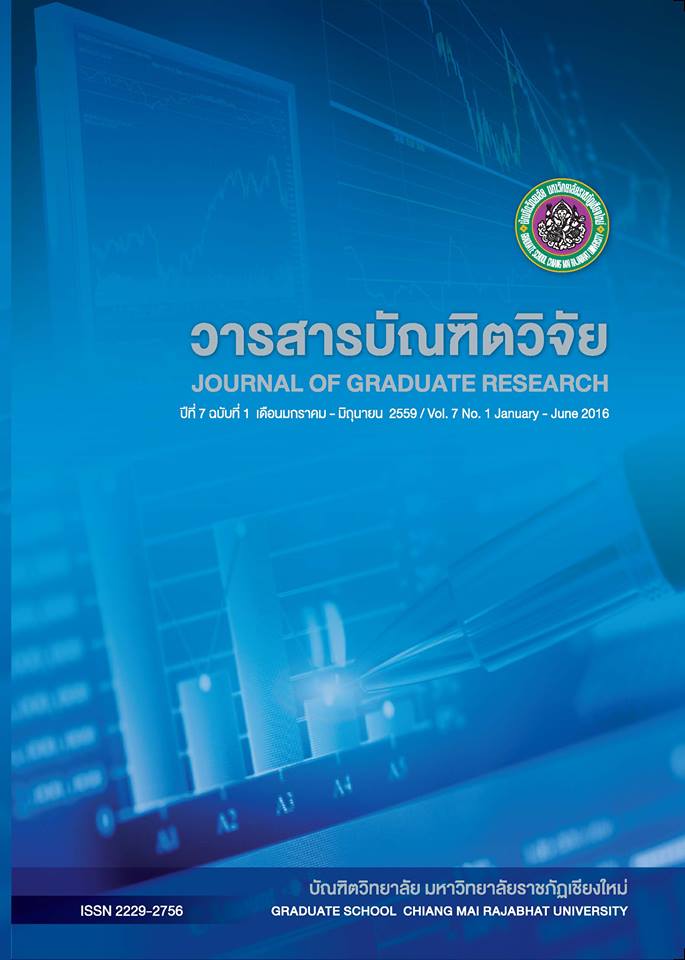ผลของโปรแกรมปรับเปลี่ยนพฤติกรรมการสูบบุหรี่ ในผู้ชายวัยทำงาน อำเภอไชยา จังหวัดสุราษฎร์ธานี
Main Article Content
Abstract
การวิจัยนี้เป็นการวิจัยกึ่งทดลองแบบสองกลุ่มวัดผลก่อนและหลังการทดลอง มีวัตถุประสงค์ เพื่อศึกษาผลของโปรแกรมปรับเปลี่ยนพฤติกรรมการสูบบุหรี่ในผู้ชายวัยทำงาน อำเภอไชยา จังหวัดสุราษฎร์ธานี กลุ่มตัวอย่างที่ใช้ในการศึกษาคือผู้ชายวัยทำงานจำนวน 52 คน เลือกกลุ่มตัวอย่างด้วยวิธีสุ่มอย่างง่าย โดยแบ่งเป็นกลุ่มทดลอง 26 คน กลุ่มควบคุม 26 คน กลุ่มทดลองได้รับโปรแกรมปรับเปลี่ยนพฤติกรรมการสูบบุหรี่โดยการประยุกต์แนวคิดแบบความเชื่อด้านสุขภาพ เป็นเวลา 4 สัปดาห์ กิจกรรมประกอบด้วยการอภิปรายกลุ่มแลกเปลี่ยนประสบการณ์ ได้แสดงออก รับรู้ซึ่งกันและกันหาวิธีการแก้ไขปัญหาร่วมกัน ส่วนกลุ่มควบคุมได้รับเอกสารแผ่นพับคู่มือการเลิกสูบบุหรี่ด้วยตนเอง เครื่องมือที่ใช้ในการวิจัย ประกอบด้วย โปรแกรมปรับเปลี่ยนพฤติกรรมการสูบบุหรี่ สมุดบันทึกการเลิกสูบบุหรี่ และแบบสอบถาม ประกอบด้วย 1) ข้อมูลทั่วไป 2) การรับรู้โอกาสเสี่ยงต่อโรคที่เกิดจากการสูบบุหรี่ 3) การรับรู้ความรุนแรงของโรคที่เกิดจากบุหรี่ 4) การรับรู้ประโยชน์ของการไม่สูบบุหรี่ 5) การรับรู้อุปสรรคของการไม่สูบบุหรี่ และ 6) แบบสอบถามพฤติกรรมการสูบบุหรี่ วิเคราะห์ข้อมูลด้วยสถิติเชิงพรรณนา Paired t-test และ Independence t-test
ผลการวิจัยพบว่า ภายหลังเข้าร่วมโปรแกรมกลุ่มทดลองมีคะแนนเฉลี่ยในทุกด้านสูงกว่ากลุ่มควบ คุม ดังนี้ การรับรู้โอกาสเสี่ยงต่อโรคที่เกิดจากการสูบบุหรี่ (ก่อน = 9.80 , SD = 1.93 และหลัง
= 11.92 , SD = .97 ) การรับรู้ความรุนแรงของโรคที่เกิดจากบุหรี่ (ก่อน
= 9.57 , SD = 1.94 และหลัง
= 11.96 , SD = 1.03) การรับรู้ประโยชน์ของการไม่สูบบุหรี่ (ก่อน
= 11.15 , SD = .61 และหลัง
= 12.23 , SD = 1.14 ) การรับรู้อุปสรรคของการไม่สูบบุหรี่ (ก่อน
= 10.26 , SD = 2.10 และหลัง
= 11.42 , SD = 1.72 ) อย่างมีนัยสำคัญทางสถิติ และมีคะแนนพฤติกรรมการสูบบุหรี่สูงขึ้นกว่ากลุ่มควบคุม (ก่อน
= 23.61 , SD = 6.45 และหลัง
= 27.57 , SD = 5.87 ) อย่างมีนัยสำคัญทางสถิติ และมีคะแนนพฤติกรรมการสูบบุหรี่สูงขึ้นกว่ากลุ่มควบคุม (ก่อน
= = 23.61 , SD = 6.45 และหลัง
= = 27.57 , SD = 5.87 ) อย่างมีนัยสำคัญทางสถิติ
ผลการวิจัยครั้งนี้แสดงให้เห็นว่าโปรแกรมปรับเปลี่ยนพฤติกรรมการสูบบุหรี่สามารถปรับ เปลี่ยนพฤติกรรมในการเลิกสูบบุหรี่ของผู้ชายวัยทำงานและสามารถนำไปประยุกต์ใช้ในพื้นที่อื่น ๆ ได้
THE EFFECTS OF THE MODIFYING SMOKING BEHAVIOR PROGRAM OF WORKING MEN IN CHAIYA DISTRICT, SURATTHANI PROVINCE.
This quasi-experimental research, a randomized two-group pretest – posttest design, aimed to investigate the effects of the modifying smoking behavior program on working men in Chaiya district, Suratthani province. The total sample consisted of 52 male workers and were selected and randomly divided into an experimental group (n=26) and a control group (n=26). The experimental group took part in a modifying smoking behavior program according to the health belief model. The experimental group participated in group discussion and cessation counseling once a week for 4 weeks. Activities in the program include: group discussions, sharing experiences, expressing mutual recognition and finding solutions to solve the problems. The control group received brochures which is a guide to quit smoking on their own. Data were collected by using individual smoking diaries and questionnaires that include: 1) demographic questionnaire, 2) the perceived risk of diseases caused by smoking, 3) the perceived severity to diseases caused by smoking, 4) the perceived benefits of not smoking, 5) the perceived barriers to quit smoking, and 6) smoking behavior questionnaire. The data were analyzed using descriptive statistics, Paired t-test, and Independence t-test
The results found that after participating in the modifying smoking behavior program for 4 weeks, the experimental group had a significantly higher mean score on the perceived risk of diseases caused by smoking (before = 9.80 , SD = 1.93 , after = 11.92 , SD = .97), the perceived severity to diseases caused by smoking (before
= 9.57 , SD = 1.94 , after
= 1.96 , SD = 1.03), the perceived benefits of not smoking (before
= 11.15 , SD = .61 , after
= 12.23 , SD = 1.14), and the perceived barriers to quit smoking (before x =10.26 , SD = 2.10 , after
= 11.42 , SD = 1.72) than that of the control group at week 4 as well as the mean score of smoking behavior (before
= 23.61 , SD = 6.45 , after
= 27.57 , SD = 5.87) was also significantly higher than that of the control group.
The results of study revealed that the modifying smoking behavior program can change smoking behaviors of working men. It should be applied to other groups of smokers in other areas.


